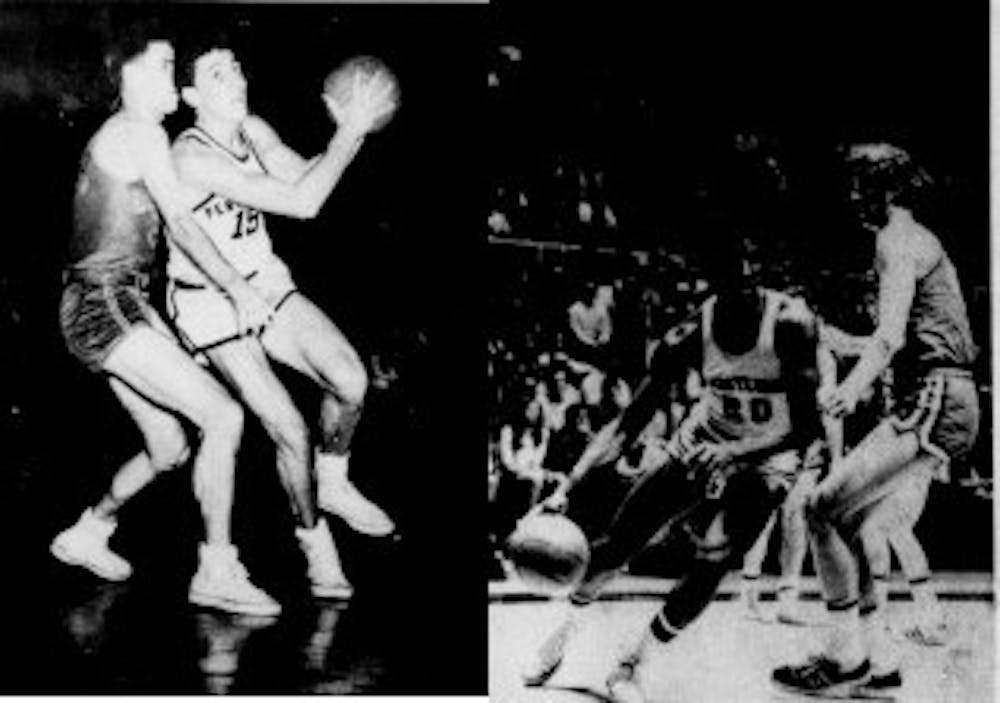In our second article in this series on Penn players being drafted to play in professional sports leagues, we are analyzing Quakers who have been drafted into the NBA and how their careers stack up to that of the average pro basketball player.
The first chart shows how many players from Penn were drafted into the NBA by decade. The decade with the most Quakers selected is the 1970s, the most successful decade in Quaker basketball history.
The Red and Blue compiled a record of 223-56 and had only 13 conference losses over the entire decade on their way to eight NCAA tournament appearances in the 10-year span. The Quakers topped off the decade in the 1979 tournament with a legendary Final Four run that included a historic second round upset of Dean Smith’s No. 1 North Carolina Tar Heels. This led to 13 Quakers being drafted into the NBA during the course of the decade.
The first Penn player drafted into the NBA was Francis “Chink” Crossin, who donned the Red and Blue for the 1943 and 1944 seasons before being drafted to serve in World War II. Crossin returned to Penn for the 1947 season and then was drafted sixth overall by the Philadelphia Warriors in that year’s draft.
Another player of note is Ernie Beck, who was selected second overall in the 1953 draft, the highest draft selection of any Penn player in history. This selection was following a season in which Beck dominated the Ivy League, leading the Red and Blue to a conference title and NCAA Tournament berth while averaging 25.9 points and 17.3 rebounds per game.
Two Quakers were selected in the first round of the draft during the historic stretch in the 1970s, including Corky Calhoun, selected fourth overall in the 1972 NBA Draft. Following his high selection, Calhoun went on to play eight NBA seasons, the most of any Penn alum.
Since 1980, only four Quakers have been drafted. The most recent selection was Jerome Allen, who was picked in the second round by the Minnesota Timberwolves in 1995 following two Ivy League Player of the Year awards. After two seasons in the NBA, Allen went on to play overseas for 12 seasons, before retiring and returning to Penn to take over as head coach in 2009. He left the Quakers in 2015 and is currently an assistant coach for the Boston Celtics.
RELATED:
Analyzing Penn's NFL Draftees: When were they drafted and how successful were they?
Inside Bob Weinhauer's five-year tenure at the helm of Penn men's basketball
This chart shows the average NBA statistics of Penn players who were drafted and played in the NBA compared to those of other NBA players. While the average Penn graduate’s NBA career is less successful than that of the average NBA player, there are a few Quakers who have finished their careers with a couple of metrics above average compared to those compiled by other professional players.
Corky Calhoun, Dave Wohl, and Ernie Beck all played longer than the average 4.5 seasons. Calhoun played the most, with eight, while Beck and Wohl were both in the NBA for seven years.
Calhoun is also the only player to average more than the average 3.5 rebounds a game, averaging 3.6 for his career. In addition, Wohl averaged 3.4 assists per game in his career, a significantly greater amount than the figure compiled by the average NBA player over their career. Calhoun and Wohl are also the only two Quakers to average more than 18 minutes per game for their NBA careers.
No Penn players have ever averaged more than 10 points per game for an NBA career, but Beck, Wohl, and Calhoun all managed to score more than five points per game, with Beck leading the group by virtue of his scoring 6.3 points per game over his seven NBA seasons.
The Quakers' 24 NCAA tournament appearances, the second most of any Ivy League school, make the Red and Blue of the most successful basketball programs in the Ivy League. With a history of sending players to play professionally, both to the NBA and other professional basketball leagues all over the world, the Quakers look to continue to continue their program’s great legacy far into the future.









